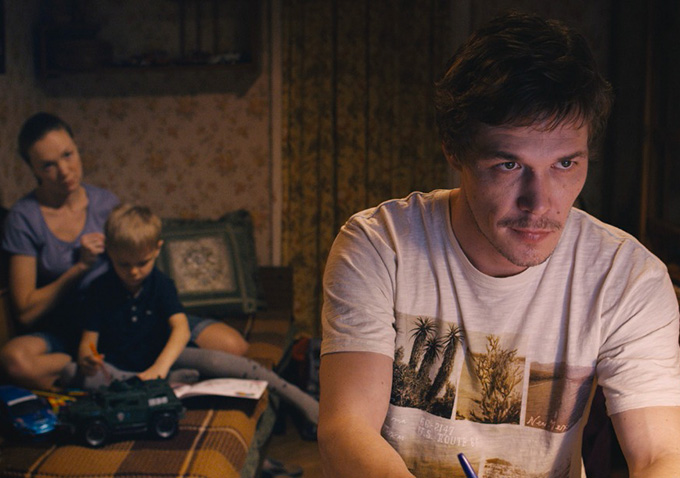 Are we in the midst of a new Russian cinematic wave? It’s starting to feel that way. It hasn’t been a full year since Andrey Zvyagintsev’s astounding “Leviathan” premiered at Cannes on its way to a Golden Globe win and an Academy Award nomination. But while the film stormed through the festival circuit last year, Zvyagintsev’s David vs. Goliath tale was an unwitting Goliath to Yuriy Bykov’s David. A smaller film in almost every respect and less sophisticated in execution but unquestionably cut from the same cloth, Bykov’s “The Fool” tells the story of one man’s desperate attempt to save 800 tenants living in a dangerously dilapidated building. It’s another thunderous win for Russian cinema, mercilessly tearing at the stitches of a country’s political system to reveal a festering wound.
Are we in the midst of a new Russian cinematic wave? It’s starting to feel that way. It hasn’t been a full year since Andrey Zvyagintsev’s astounding “Leviathan” premiered at Cannes on its way to a Golden Globe win and an Academy Award nomination. But while the film stormed through the festival circuit last year, Zvyagintsev’s David vs. Goliath tale was an unwitting Goliath to Yuriy Bykov’s David. A smaller film in almost every respect and less sophisticated in execution but unquestionably cut from the same cloth, Bykov’s “The Fool” tells the story of one man’s desperate attempt to save 800 tenants living in a dangerously dilapidated building. It’s another thunderous win for Russian cinema, mercilessly tearing at the stitches of a country’s political system to reveal a festering wound.
In an unnamed Russian town one long night, Dima’s (Artyom Bystrov) entire world is rocked to its core. He is a plumber living a humble and crammed lifestyle with a wife (Darya Moroz), a young son, and both his parents, now retired and barely surviving on their pensions. When he’s called in to inspect a dormitory that’s not part of his district, he is shocked at its ruinous state. He finds two gigantic through-wall cracks on either side of the building and realizes that the entire foundation is crumbling. With the chief inspector still AWOL in the aftermath of a drinking binge, Dima can do little else but go home and try to reach the proper authorities first thing in the morning. But he can’t sleep. In the middle of the night after some research, he reaches the ominous conclusion that the building will most likely collapse in less than 24 hours.
 Despite the late hour, Dima is determined to warn the administrative chiefs that immediate evacuation has to take place. But every rotten egg is in one basket that night: all the officials are getting smashed while celebrating the birthday of the town’s mayor, Nina Galaganova (Natlya Surkova).
Despite the late hour, Dima is determined to warn the administrative chiefs that immediate evacuation has to take place. But every rotten egg is in one basket that night: all the officials are getting smashed while celebrating the birthday of the town’s mayor, Nina Galaganova (Natlya Surkova).
“The Fool” is a scathing depiction of a depressingly broken society. The film opens with a tremendous single take that tells you everything you need to know about miserable state of the poor souls living in the building in question; drug addicts, wife beaters, alcoholics and various “nobodies,” as they’re called at one critical point. Bykov is unapologetic in his depiction of the very same folks that Dima so desperately feels he has an obligation to save, which gives his story its moral pulse. At what point is a prostitute considered worthy of dignity accorded everyone else? When one of the bureaucrats asks Dima if he’s from another planet, it hits you like a ton of bricks: human compassion is an alien concept for this a glorified gang of racketeers and embezzlers. A man like Dima is their worst nightmare.

One gets the impression that every man and woman responsible for writing, directing, shooting and performing this story was fighting back tears, in light of how raw and passionately despairing the film’s message is. Bykov loves long takes without an ounce of gimmickry, and he employs a simple, absurdly effective technique where a character stares at something off-screen and the camera slowly, almost fearfully, turns 90 degrees to see what it is. Instilled with this sense of narrative urgency and dread and constructed around events that unfold over a single night, the film’s 2-hour running time passes by in a flash. It’s a sensation that’s fuelled further by Bykov’s scintillating dialogue and the ensemble performance. Bystrov does a fantastic job of chiseling at the viewer’s heart, but it’s Surkova who soars. She’s got a handful of highlight-reel scenes, and the one I’ll dub “bureaucratic confessions,” in which she impugns the integrity of every single man in the room is a performance of the highest caliber.
As a way of compensating for its own pessimistic nature, “The Fool” invites Schadenfreude-ian slips of laughter. But by the time the film ends, especially with its memorable final shot, you can’t help but feel depleted. Bykov is perhaps a little too earnest and overt in handling this theme, which is indicative when the dialogue feels too conspicuously damning and in his use of unduly sentimental music. Since it’s not as cinematically sophisticated as “Leviathan,” the inevitable comparison will most likely hurt Bykov’s drama. In an ideal world, the films will be weighed separately and this film more than holds its own. As a furiously compelling portrait of a corrupt system and an incredibly compact morality tale, Yuriy Bykov’s “The Fool” is must-see cinema. [B+]

